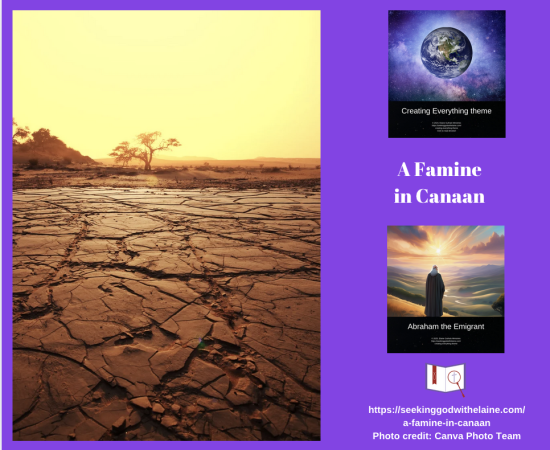We don’t know how long Abram was in Canaan before his next separation and testing took place. This devotional reading looks at Abram, Sarai, and Lot’s trip to Egypt and the lie that got them in trouble.
Nuggets
- Even when we are where God calls us to be, testings and trials arise.
- Abram chose to move his family to Egypt because of the famine.
- As obedient as Abram had been, he succumbed to the temptation of sin by not believing God could handle what his new circumstances were.

Abram’s family was really a dysfunctional family.
Abram was in a pickle. He didn’t feel that he could provide for his family and flocks during the famine where they were at, but this doesn’t say God told him to go to Egypt.
Then again, it doesn’t say God didn’t tell him to stay.
Ooo, baby. We have to stay obedient to God regardless of the circumstances. We need to trust Him through it all.
Let's Put It into Context
To read devotions in the Creating Everything theme, click the button below.
Devotions in the Abraham the Emigrant series
Leaving Home Again
“At that time a severe famine struck the land of Canaan, forcing Abram to go down to Egypt, where he lived as a foreigner” (Gen. 12: 10 NLT)
Famine
Even when we are where God calls us to be, testings and trials arise.
In the last devotion, we talked about the unpredictability of the region. It had both fertile land and unpredictable weather.
The unpredictable weather reared its ugly head as a famine. We don’t know how long Abram and Sarai had been in the region, but they were on the move again.
This was the first of two famines Abram would encounter. The other we will discuss when we get to Genesis 20.
We’re getting a little ahead of ourselves, but Abram did come back to the Promised Land (even though they weren’t calling it that yet).
Back to this famine.
Think of it. We are going to face natural setbacks. We have to have faith.
The famine must have been really bad for Abram to even consider moving. It must have been widespread for him to consider moving to another country. Candlish said that he was starved out.
Resource
Meyer tried to give us an idea of what Abram’s situation was. He wrote.
“A stranger in a strange land; surrounded by suspicious and hostile peoples; weighted with the responsibility of vast flocks and herds — it was no trivial matter to stand face to face with the sudden devastation of famine. Did it prove that he had made a mistake in coming to Canaan?”
Resource
Oh, yeah. Abram probably had some of the doubts we have, too. We get really good at questioning God after the fact when things don’t turn out the way we think they should.
That has the potential of making us take our focus off God. Makes it a good test, doesn’t it? Can we focus on God over and above the chaos?
Pearse argued that we are selfish when we think testing and trials – even from natural causes – happen. How are we going to endure if these don’t occur to challenge us? “But the one who endures to the end will be saved” (Mt. 24: 13 NLT).
Resource
The onset of these trials doesn’t mean that God has forsaken us. It means He is sanctifying us.
Ooo, baby. Leale had a good question. How do our current testings and trials make us look at our past ones? He fears we may exaggerate estimations of what we have gone through before.
Resource
We say we take what we have learned from past experiences, evaluate what we are going through now, and grow. But if our perception of the past is flawed, the growth is flawed, isn’t it?
I can just see Satan using that to ensure that we are thinking we’re good to go — but we aren’t.
Egypt
Abram chose to move his family to Egypt because of the famine.
There is one tidbit on which this section that is glaringly silent. Did God tell Abram to go to Egypt? Maybe. Maybe not.
Did Abram have any business being in Egypt? Not if God didn’t tell him to go.
Something just occurred to me. We don’t see Abram calling on the name of the Lord here.
We know that happened. “… At that time people first began to worship the Lord by name” (Gen. 4: 26 NLT).
Maybe that was part of the problem.
We aren’t told how long Abram and Sarai stayed in Egypt, but we are given only one chapter of their story there – and it isn’t a flattering one.
That may tell us they weren’t supposed to go.
But isn’t that how it goes? One sin leads to another.
Since it said Abram lived as a foreigner in Egypt, I would think he took his whole household. Jacob did when he moved to Egypt in that famine.
- “So Jacob set out for Egypt with all his possessions …” (Gen. 46: 1 NLT).
- “So Jacob left Beersheba, and his sons took him to Egypt. They carried him and their little ones and their wives in the wagons Pharaoh had provided for them. They also took all their livestock and all the personal belongings they had acquired in the land of Canaan. So Jacob and his entire family went to Egypt — sons and grandsons, daughters and granddaughters — all his descendants” (Gen. 46: 5-7 NLT).
Abram probably didn’t know how long the famine was going to last. He didn’t have a Joseph-type down in Egypt prophesying there was even going to be a famine.
Pearse had a great observation. There was one thing that Abram did leave behind – his altar.
Resource
We lose a lot when we don’t consistently meet with God in His house. But we lose even more if we do not have a strong daily devotional time. Meeting God once a week for an hour or two doesn’t make us a stronger disciple.

I did come across an interesting statement. In a sermon by The Congregational Pulpit, it was written that Egypt was, as in Joseph’s time, the granary of the world.
Resource
We may question why God sent a famine that would lead to another road trip. It was another testing of his obedience.
It was a little more than that, I think. “Then the Lord appeared to Abram and said, ‘I will give this land to your descendants’ …” (Gen. 12: 7 NLT).
Abram wasn’t given the land in Canaan. He wasn’t even given possession of any of it until later in life.
That may have caused Abram to still have the urge to wander. If he doesn’t own the land, how can he put down roots?
But surely, Abram considered God’s provision getting him from Ur to Shechem. Whether obedient or not, Abram and Sarai headed down to Egypt.
The Lie
As he was approaching the border of Egypt, he said to his wife, Sarai, ‘Look, you are a very beautiful woman. When the Egyptians see you, they will say, “This is his wife. Let’s kill him; then we can have her!” So please tell them you are my sister. Then they will spare my life and treat me well because of their interest in you’” (Gen. 12: 11-13 NLT)
As obedient as Abram had been, he succumbed to the temptation of sin by not believing God could handle what his new circumstances were.
Abram thought he would run into trouble in Egypt. He was concerned for his life. He thought the men of Egypt would kill him to take Sarai ig he told them he was her husband..
Moses doesn’t tell us how much of a struggle Abram had making this decision. We have no way of knowing if Abram immediately thought God wouldn’t be able to take care of them or if he had to talk himself into it.
Abram decided to tell, and Sarai agreed to go along with, a lie. He forfeited truth for safety.
True, Sarai was Abram’s sister. But she was more – she was his wife. “And yet indeed she is my sister; she is the daughter of my father, but not the daughter of my mother; and she became my wife” (Gen. 20: 12 NLT).
Isn’t it easier to live the lie when it has an element of truth? But it is still a lie in God’s eyes.
Our affection for others can cause fear to enter into our hearts. Yes, we are to love our family.
But Abram wasn’t really worried about Sarai in this instance. He was worried for himself! He was asking Sarai to lie for him for his benefit.
Faith opposes false practicality. We can’t conceal the truth because a lie would be easier or more rewarding.
God’s Word talks a lot about lying. It is always the same outcome – don’t.
- “You must not testify falsely against your neighbor” (Ex. 20: 16 NLT).
- “The Lord detests lying lips, but he delights in those who tell the truth” (Prov. 12: 22 NLT).
- “So stop telling lies. Let us tell our neighbors the truth, for we are all parts of the same body” (Eph. 4: 25 NLT).
- “Don’t lie to each other, for you have stripped off your old sinful nature and all its wicked deeds” (Col. 3: 9 NLT)
- “For you are the children of your father the devil, and you love to do the evil things he does …” (Jn. 8: 44 NLT).
- “A false witness will not go unpunished, nor will a liar escape” (Prov. 19: 5 NLT).
Pearse had an interesting take. Instead of not trusting God, he thought it was more like Abram didn’t like confrontation. He was a peaceful man.
Resource
Yeah, that goes down better. Abram was so steadfast up until now. He obeyed when he was going even though he didn’t know where.
How could Abram not trust God now?
Don’t we hate it when Hall of Famers disobey God? If they mess up, how will we not?
But Abram — like us — probably thought this was a small thing. It was just a lie. We don’t like to bother God with the small things.
Why is God so concerned about the small things? “Trust in the LORD with all your heart; do not depend on your own understanding. Seek his will in all you do, and he will show you which path to take” (Prov. 3: 5-6 NLT).
God says, “Nothing you go through is a small thing to me. You must decide in every situation whether nor not you are going to trust me and obey me.”
God knows we are not going to be 100% fruit-of-the-Spirit perfect. He knows He will forgive us when we ask.
Making the Connections #1
Maybe God did want Abram and Sarai to go to Egypt. Gibson thought so.
We know God separated Abram from “… your country and your kindred and your father’s house …” (Gen. 12: 1 NLT). Isn’t this just another separation?
God was training Abram by a sequence of separations. We say it was to increase Abram’s faith.
Look what Gibson said. He wrote, “We are accustomed to consider faith as the key to Abraham’s life. Certainly it is; but did not his faith manifest itself in just this, that he was willing to separate himself from all for the Lord’s sake?”
Resource
How was Abram separated?
- Left his country and kin (Gen. 11: 31).
- Father died (Gen. 11: 32).
- Left Haran (Gen. 12: 1)
- Left Canaan for Egypt (Gen. 12: 10).
- Left Egypt (Gen. 12: 20).
- Separated from Lot (Gen. 13: 13).
- Separated from Ishmael (Gen. 21: 14).
- Almost separated from Isaac (Gen. 22: 10).
- Sarah died (Gen. 23: 1-2).
- Separated from worldly possessions (Gen. 25: 5).
- Died (Gen. 25: 7-8).
Abram was willing to obey God’s commands regardless of what he had to surrender.

Making the Connections #2
Gibson took it a step farther.
We’ve been talking about separation since Cain and Abel — maybe even since Adam and Eve and the Garden.
Abram’s covenant is based on separation and grace. But now we add in restriction. This is where we really hone in on the fact that Abram’s line is the chosen line.
Gibson said that God’s mercy had been offered and rejected three times. I would say those times are the following.
- In the Garden.
- During the building of the ark.
- At the construction of the Tower of Babel.
It would be easy to say — especially at the flood but here also — God was choosing to bless only one family. But God’s Word quickly debunks that.
- “For this is how God loved the world: He gave his one and only Son, so that everyone who believes in him will not perish but have eternal life” (Jn. 3: 16 NLT).
- “But God showed his great love for us by sending Christ to die for us while we were still sinners” (Rom. 5: 8 NLT).
Even God’s covenant with Abram says it is for all. “… All the families on earth will be blessed through you” (Gen. 12: 3 NLT).
God is right there to hear the sinner’s sincere prayer of repentance and submission.
How did Gibson describe it? He wrote, “‘The sons of the stranger’ have simply to leave their country and their family, and come and join themselves to the family of Abraham, and to the nation of the Jew, and they are made welcome.”
Resource
- We have to turn our back on sin.
- We have to choose to align ourselves with the Church.
- We have to follow God’s laws and commandments.
Pastor Steve and I question often how much of the Jewishness has been stripped from how we worship. We know there is evidence that it has been.
So, it begs the question: are we really worshiping God or following oral traditions of our denominations, just as the Pharisees did?
Take heart at what Leale said. He wrote, “When a man has the habitual intention of pleasing God, and when his faith is real and heart sincere, the lapses of his infirmity are graciously pardoned. God makes for him a way of escape, and grant the comfort of fresh blessings and an improved faith.”
Resource
Real faith + sincere heart = forgiveness, pardon, and increased faith.
Making the Connections #3
Have you ever thought of the irony that Abram and Jacob spent time in Egypt?
A couple of chapters down the road, Abram will be told that his descendants will go to a foreign land, but he was not told which. “Then the Lord said to Abram, “You can be sure that your descendants will be strangers in a foreign land, where they will be oppressed as slaves for 400 years” (Gen. 15: 13 NLT).
But what would Abram have seen in Egypt then? Stanley helped paint a picture. He wrote.
“Egypt was to Abraham — to the Jewish people — to the whole course of the Old Testament, what the world, with all its interests, and pursuits, and enjoyments, is to us. It was the parent of civilization, of art, of learning, of royal power, of vast armies.”
Resource
The Hebrews learned many things when they sojourned in Egypt. True, it didn’t end well for Abram’s immediate descendants. Plus, future relations weren’t good for the two nations.
Abram saw Egypt. Jacob saw it. Joseph saw it. Jesus saw it.
What was Stanley’s moral of the story? Disciples can utilize the world and its enjoyments to help us develop and to glorify God for its beauty and usefulness.
Making the Connections #4
It has always amazed me that Abram would stoop to saying that Sarai was his sister, and not his wife. It has always flabbergasted me that she went along with the lie.
How does one demean their life partner like that?
Maybe I don’t understand the culture of that time. Maybe I don’t fully grasp the barbarisms of people then.
Maybe love between husband and wife meant something totally different to Abram and Sarai. But I don’t think so.
Sarai was Abram’s only wife. Yes, he took Hagar as his concubine, but not as his wife.
But this is not the way God wanted families to work. He wants us to be proud of our family members and present a united front.
We don’t do this when we lie about our relationships.
How Do We Apply This?
Don’t rely on our own understanding.
Remember that God works everything for His good (Rom. 8: 28)
Watch so that we don’t fall to our pride and arrogance.
Expect trials in our walk with God.
Be honest in our dealings with others, not deceptive.
Recognize that our relationship with God is built on our moral character.
Resources
Father God. Thank You for the trials of life that bring us closer to You. Help us use them to grow stronger in our faith. Amen.
What do you think?
Leave me a comment below (about this or anything else) or head over to my Facebook group for some interactive discussion.
If you don’t understand something and would like further clarification, please contact me.
If you have not signed up for the email providing the link to the devotions and the newsletter, do so below.
If God has used this devotion to speak with you, consider sharing it on social media.